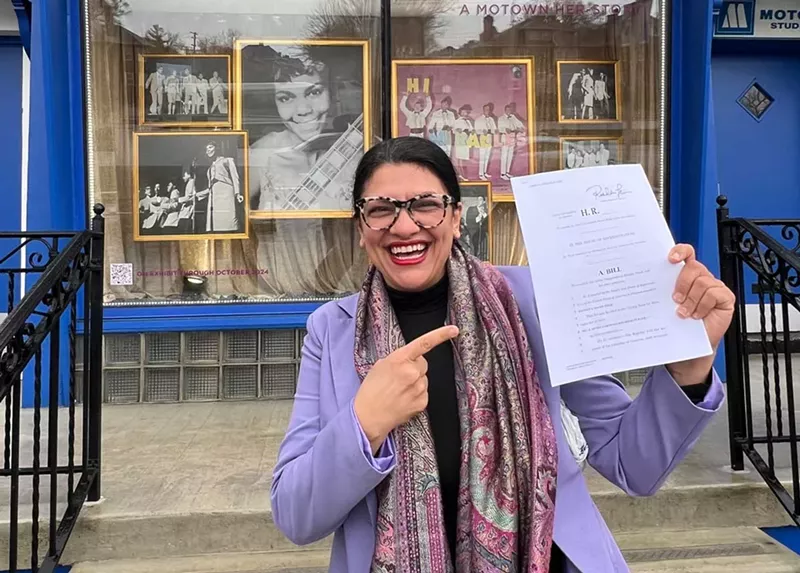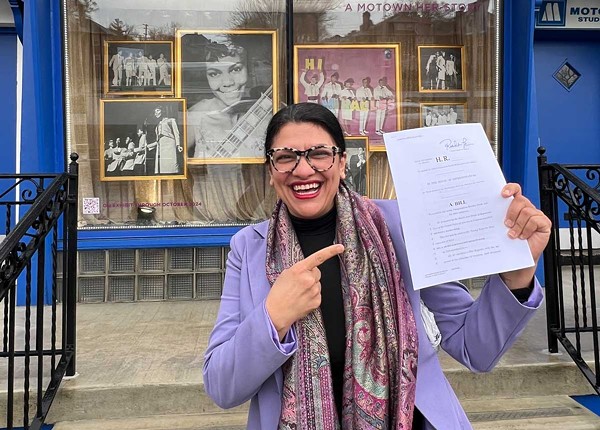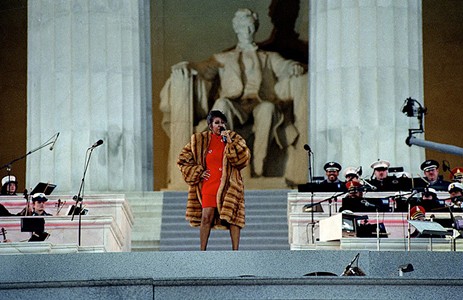
Courtesy photo
U.S. Rep. Rashida Tlaib celebrates the Living Wage for Musicians Act outside of Detroit’s Motown Museum.
The latest target of U.S. Rep. Rashida Tlaib? The music industry.
On Wednesday, the congresswoman announced the Living Wage for Musicians Act, new legislation aimed at reforming the music industry and digital streaming platforms like Spotify that pay only fractions of a penny per streamed song.
Tlaib partnered with New York congressman Jamaal Bowman for the bill, as well as the United Musicians and Allied Workers (UMAW) and local and national artists.
“Detroit is one of the music capitals of the world, and our artists here have changed the music industry and our culture in so many incredible ways,” Tlaib said in a statement. “It’s only right that the people who create the music we love get their fair share, so that they can thrive, not just survive.”
The Living Wage for Musicians Act proposes a new royalty compensation for streams for artists at one cent per stream. Currently, musicians make fractions of a penny per stream. At Spotify, the world’s largest streaming service, artists make a piddling $0.003 per stream.
The proposed legislation was celebrated by local and national independent artists.
“I’m very grateful for Rashida’s work to bring overdue changes to the music industry that restore equity and a sense of value for musicians all over,” Detroit artist and WDET radio host Shigeto said in a statement. “Artists have been taken advantage of since the inception of digital streaming. The Living Wage for Musicians Act gives voice to independent musicians and could potentially change a lot of artists’ lives by giving them a sustainable revenue stream.”
“There is a lot of talk in the industry about how to ‘fix’ streaming – but the streaming platforms and major labels have already had their say for more than a decade, and they have failed musicians,” said UMAW organizer and musician Damon Krukowski, a former member of indie rock band Galaxie 500 who now performs as psych-folk duo Damon and Naomi. “The Living Wage for Musicians Act presents a new, artist-centered solution to make streaming work for the many and not just the few. We need to return value to recordings by injecting more money into the system, and we need to pay artists and musicians directly for streaming their work.”
In a statement, the bill’s sponsors say that reforming streaming would help the entire music industry, which has faced hardship in the digital era with a decades-long decline in record sales and especially following the labor shortages and supply chain issues caused by the COVID-19 pandemic.
“By creating a fund that directly compensates recording artists and musicians, the bill will allow vastly more artists to achieve a living wage from music, enabling them to pay rent, raise a family, buy a home, and invest in their future,” a press release states. “Recording artists also employ many other professionals in the music industry, all of whom are suffering from the current lack of financial return from streaming: producers, arrangers, sound engineers, mastering engineers, recording studios, non-featured performers and others will all benefit from these direct payments to recording musicians.”
It adds, “The bill raises the standard of living for these workers which will reverberate beyond just the music industry by injecting more money into our local economies.”
The Living Wage for Musicians Act would tax the non-subscription revenues of digital streaming providers like Spotify, Apple Music, and Amazon, as well as add a small fee to the price of music streaming subscriptions. The bill also includes a maximum payout per track per month “in order to generate more sustainable income for a broader and more diverse set of artists beyond the world’s most popular performers.”
“Streaming services wouldn’t exist without the brilliant work of artists who choose to share their music with these platforms,” Bowman said in a statement. “Streaming services make billions of dollars a year off the hard work of musicians, but those creators make less than a penny every time we stream their songs. It is unconscionable that in order to buy a cup of coffee, an artist needs someone to stream their song over a thousand times. Artists and musicians across the country deserve to be paid for their work. I represent the Bronx, the birthplace of Hip Hop, where music is the foundation of our communities. They all deserve to be paid fairly for their incredible and transformative art. The music industry can and should work for everyone, especially up and coming and independent artists who use streaming to share their work with the world. Ensuring streaming services pay their artists a fair wage is just a first step to ensure the artists in our communities can pay their bills while following their passion.”
The full text of the Living Wage for Musicians Act is available online.

